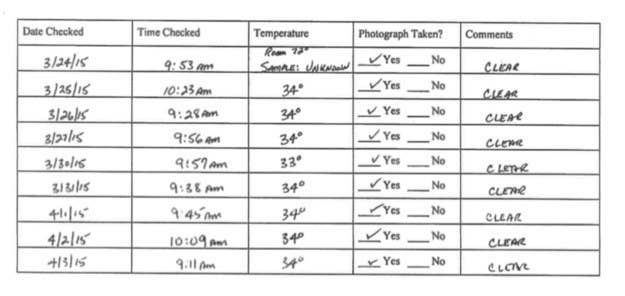A Georgia inmate alleged in court filings Thursday that the state purposefully withheld evidence on what went wrong with the controversial execution drugs that were supposed to be used in her aborted execution, because the results contradicted the state's narrative that the drugs were ruined by a simple storage mistake.
Inmate Kelly Gissendaner was scheduled to be put to death in March, but her execution was called off prior to the lethal injection after the state found particles floating in the syringe. She has sued Georgia, arguing that the state put her in "a state of immense fear and anxiety for thirteen hours while dithering over whether to proceed with her execution."
Georgia has pushed to have the suit dismissed and maintains that the likeliest cause of the drug's problems were because of the coldness in which it was stored.
However, in supporting that assessment, the state initially withheld test results that undermined that argument. State officials originally refused to turn over the results to a BuzzFeed News open records request, but later filed them in the court, saying they had changed their mind "after reflection."
"The simplest explanation is that [the state] withheld this information because it undercut their preferred explanation…," Gissendaner's attorney, Gerald "Bo" King wrote in a filing late Thursday. King added that BuzzFeed News forced Georgia's hand by publishing that the state was withholding the results.
The Georgia Department of Corrections declined to comment.
State officials performed the test by taking another batch of the drugs and storing one version in a cold environment and one at room temperature. If the "cold" drug had particles floating in it, but the other one did not, then that would support the Department of Corrections' narrative that it was caused by temperature.
But at the end of the experiment, both of the drugs were clear.

"Based upon his review of [the state]'s cold-storage testing, however, Dr. [Michael] Jay believes that temperature was not a factor in the precipitation of their lethal injection drugs," King wrote. "Instead, the fact that the new batch of drugs did not precipitate strongly suggests that the drugs obtained for Ms. Gissendaner's execution on March 2 were compounded improperly."
The state's own expert, Dr. Jason Zastre, has testified that temperature was the likeliest cause of the drug problems, but added that it could also be because of deficiencies in how it was mixed.
Georgia, like several other death penalty states, does not used drugs made from an FDA-approved manufacturer. Instead, the state relies on a pharmacist to mix the drug in secret. Critics say the secrecy prohibits meaningful oversight into the qualifications and regulatory history of the people making the drugs.
When the state turned over the experiment's results, Attorney General Sam Olens' Office argued that it didn't disprove their argument because "storing pentobarbital at temperatures that are too cold does not always cause precipitation."
The state would undoubtedly prefer the drug's problems being caused by temperature. If that were the case, then this could be prevented from happening in the future by Corrections purchasing a new fridge.
But if that isn't what went wrong — and if there are more serious problems with how the drug is mixed by a secret pharmacist, as Gissendaner alleges — then it will be much harder for the state to fix.
Gissendaner was sentenced to death in 1998 for plotting the death of her husband, Douglas Gissendaner, with her boyfriend. The judge has not yet weighed in on if Gissendaner can be executed.
